- Home
- Charles L. Grant
The Pet Page 2
The Pet Read online
Page 2
Don laughed. "What? You mean there's such a thing as lawful mutilation?"
"Sure. Ain't you never seen the dumb clothes Chris wears? Like she was a nun sometimes? That's mutilation, brother, and she ought to be arrested for it."
They laughed quietly, shaking their heads, sharing the common belief that Chris Snowden's figure was more explosive than dynamite, more powerful than a speeding bullet, more likely to cause heart attacks in every senior class male than failing to make graduation.
Lichter took off his glasses and polished them on his jacket. "I'll tell you, she's enough to make me wish I was a virgin again."
This time Don's laugh was strained, but he nodded just the same. He wasn't a prude; he didn't mind talk about sex and women, but he wished the other guys would quit their damned bragging, or their lying. If they kept it up, one of these days he was going to slip and get found out.
"So, you start studying for the bio test next week?" Lichter asked, his sly tone indicating he already knew the answer.
"Yeah, a little," he admitted with an embarrassed grin. "Should be a snap."
"Right. A snap. And if it isn't, you and I will be standing outside when graduation comes around," He sighed loudly and looked up at the stars.
"Oh, god, only eight more months and the torture is over."
The wind kicked up dust and made them turn their heads away.
"School," Jeff said then, with a slap to his arm.
"Yeah. School."
Lichter nodded, left waving at a slow trot, veering sharply right and vanishing. Don knelt to work the combination of the lock he had placed on the tire chain, then straddled the seat and gripped the arched handlebars. They were upright, cranked out of their racing position less than ten minutes after he had brought it home from the store. He didn't like hunching over, feeling somehow out of control and forever toppling unless he could straighten his back. He pushed off, then stopped as soon as he was on the sidewalk. To the right, far down the street, were the hazed neon lights of Ashford's long shopping district; directly opposite was the narrow island of trees and grass that separated the wide boulevard into its east and west lanes; to the left the street poked into a large residential area whose houses began as clean brick and tidy clapboard and eventually deteriorated into rundown brownstone and aluminum siding that had long since faded past its guarantee.
He glanced behind him and smiled suddenly.
On the path, just this side of the last lamppost, was a feather. A crow's feather twice as long as a grown man's hand. It shimmered almost blue, was caught by the wind, and tumbled toward him.
He waited until it fluttered to a stop against the bike's rear tire, then shook his head slowly. Boy, he thought, where were you when that kid opened his big mouth?
But as Jeff would say-the story of his life. Honest to god giant crows were not in his stars.
Tanker Falwick swore impotently under his breath. Thorns in the red-leafed bush had snagged his coat sleeve and held it fast, and he couldn't move quickly without making a hell of a racket. He slapped at them angrily while he rose and peered over the wall. And groaned with a punch to his leg when he saw his last chance for decent prey getting away. The boy was turning, bumping his ten-speed down off the curb and across the street. Away from the park, in spite of the moon.
It was too late. Goddamn, it was too late.
"Shit!" he said aloud, and yanked his arm until the thorns came loose.
"Fucking shit!"
A glance up at the moon riding over the trees, and he swore again, silently, hoping that the squirrel he'd killed earlier wouldn't be the only meal he'd have tonight. There hadn't been much meat and its heart had been too small, and twisting off its head didn't give him near the same satisfaction as tearing out a kid's throat.
Several automobiles sped past, a half-empty bus, a pickup with three punks huddled and singing in the bed, a dozen more cars. None of them stopped, and when he headed back into the trees, he couldn't hear a thing, except his paper stuffed shoes scuffling wearily through the leaves. He hushed himself a couple of times before finally giving up. He wasn't listening, and there was, most likely, no one else around to hear.
The whole place had just been filled with damned kids, just filled to the rafters with them, and every opportunity he'd had to introduce himself to one had been thwarted in one way or another.
A large dirt-smeared hand wiped harshly over his mouth, not feeling the stiff greying bristles on his chin, on his sallow cheeks, on the slope of his wattled neck. He sniffed, and coughed, and spat into the dark.
Then he drew his worn tweed jacket over his broad chest, hunched powerful shoulders against the wind, and moved toward the center path.
He waited in the shadows for a full five minutes, then stepped out and took a deep breath.
He didn't like it back in there. He didn't like it at all despite his affinity with the best parts of the dark. There were too many noises he didn't understand, and too many shadows that trailed after him as he trailed the children who were scurrying after their parents.
A lousy night, all in all—except for the music.
He stopped at the oval pond, checked the path, and knelt on the apron, then leaned over and scooped some of the cold water into his mouth.
The music was nice. Not bad for a bunch of fucking dumbass high school kids, and he had even recognized some of the tunes. He had been hiding behind a patch of dense laurel just to the left of the bandstand, nodding, humming silently, and applauding without sound at the end of each number. He had also been hoping that one of the punks would have to take a leak during the program and wouldn't be prissy about heading into the bushes. Tonight he wasn't fussy about the sex; one of the boys would have done just as nicely as one of them young whores.
When that didn't work and he couldn't move anyone over to him through the sheer force of his will, he had moved down toward the south entrance since that's where the fewest of the audience had headed when it was over. He was hoping for a stray, but the little ones were too good, too well-behaved, like those who were at the pond while that other kid, the older one, the punk bastard in black denim, told them a preposterous story about a stupid giant crow.
And the big ones, the punks, the snot-nosed creeps who made up most of his fun, they stuck together like glue right to the street. Especially the whores.
He rocked back on his heels and dried his face with a sleeve.
That had been a close one, that one had, the moment with the black denims. Suddenly the punk had pointed right to the tree where he had been concealed, and he thought for sure he'd been caught, the cops would be on his ass, and he'd be fried without a trial. Then the kid had jabbered on about this dumb creature of his, and there was an argument, and Tanker was able to slip away without detection.
That, he thought smugly, was the easy part because he was a werewolf.
The realization of his condition had been a long time coming, starting shortly after he had been handed his separation pay and papers. They said he had lost his touch with the new recruits; they said he wasn't living up to the image of the "new army"; they said he drank too much; they said it was against the new rules to hit the little snots when they didn't obey his commands. They said. They, who weren't hardly born when he had first signed his name in that pissant office in Hartford. And they said he ought to be able to find a pretty good job somewhere, that his pension and the job would take care of him for the rest of his life. After thirty years, though, the rest of his life wasn't all that far away.
He left Fort Gordon, Georgia, as he had arrived—on foot, his belongings slung over his shoulder. Refusing several offers of a ride, he walked into Augusta, put his things into a locker at the bus station, then went out and beat the shit out of the first kid under twenty he could find.
There had been a full moon that night, and though a number of people saw and chased him, he had escaped. He noticed the connection right away because he had been running ahead and behind his shadows the whole time, and he decide
d then and there that the moon would be his charm. It would help him in civilian life make a fortune and spit on those young bastards who thought they knew what the military was all about.
It didn't, though. It had plans for him he hadn't known at the time.
As winter passed, and the jobs passed, and he was constantly in trouble for mouthing off to spineless, candy ass bosses usually two decades his junior, he realized that.
As the money ran low, and his friends stopped their loans, and the police looked at him more closely the more his clothes began to fade, he realized that.
The moon had other plans.
Another winter and a third luckily mild. But the fourth was spent freezing to death in an overcrowded shelter for homeless men in New York City. Humiliation compounded when he was interviewed by a bleeding-heart liberal television reporter and he had tried to explain about his service to the country, and all the reporter wanted to know was if he could get a decent night's sleep in the same room with fifty other old men.
Old men.
Old man.
Christ, he had turned into an old man and he hadn't even known it.
That's when the moon came to him again. Last winter. To save him and show him what werewolves could do.
He had been stumbling along Eighth Avenue, popping into one porn place after another in hopes of getting a free peek at some tits since he hadn't the stuff to find some piece of his own, when a guy in tight jeans and leather jacket did something to his ass as he passed by.
Tanker had frozen, turned slowly, and saw the look in the kid's eyes.
Blank, like they were dead.
He had almost thrown up, but looked up and saw the moon, looked back to the young hustler and let himself smile. He still had good teeth, still tried to exercise when he had the food in him, and it wasn't hard, in that two-by-four hotel room that smelled like piss and pot, to tear the sonofabitch apart.
The moon winked.
And Tanker howled before he rolled the punk and left.
It wasn't the sex, it was the age.
"Babyfucks," he muttered. That's what they all were—babyfucks taking on the world like they knew what they were doing, leaving good men like him behind to fill up the gutters and the bars and the steps of churches that locked their doors at night.
Babyfucks who didn't know the power of Tanker Falwick, the power of the man who had personally seen the rise and the fall of the armored First Cav, who had crushed Nazis and Fascists and gooks beneath his treads, and who couldn't understand why a tank had to have all them damned computer things inside when all a man had to do was aim the fucking thing and run the enemy down. It was as simple as that, and he didn't need a babyfuck TV screen in his lap to tell him how to do it.
They said he was untrainable in the ways of the new army; they said he was unstable because he fought them every step and trench of the way; they said he had to keep going to the babyfuck shrink or they'd muster him out and leave him on his own.
They said.
But they didn't say anything about the moon, and how it felt on his face, and how the blood felt when he found the kids and tore out their throats and tore out their guts and sipped a little red and gnawed a little meat and howled his signature before moving on.
They didn't say anything about that.
He rose, skirted the pond, and headed for the ball field and the large thicket where he had watched the concert. He would sleep there tonight and hope for a bit of luck tomorrow, for something more than a squirrel to keep the moon his friend. He needed some badly. He needed something to fill his stomach and something to leave behind and something to remind all those babyfucks that Tanker Falwick was still around. He couldn't do it anymore in New York, in the state or the city, because they had found the alley lean-to where he lived when the black hooker with the blonde hair saw him one morning dressed in fresh dripping red.
But he didn't mind because there was a whole country out here just waiting to learn.
First stop, then, this burg, whatever name it had.
He didn't care. All he knew was that it had a lot of kids who thought they were going to live forever.
Despite the fact that it was a school night and his parents didn't like him staying out so late when he had to get up so early, Don decided not to go home right away. Instead, he pedaled across the boulevard, over the center island, and headed east until he reached his street. He turned into it and kept going, not looking left except to note that the station wagon wasn't in the driveway, so his folks still weren't home. And that was all right with him because it was getting harder to stand their sneaking around him as if he didn't know what was going on.
He had no idea where he was headed, only that he didn't want to get warm just yet. He liked the autumn nights, the way the air felt like thin ice on a pond, crisp and clean and ready to shatter as soon as you touched it; he liked the trees so black they were almost invisible, and the way the leaves were raked into huge gold and red piles in the gutters, and the way they made the air smell tart and smoky; he liked the sounds of things on an autumn night, sharp and ringing and carrying a hundred miles. It was somehow comforting, this stretch of weeks before November, and he wanted to enjoy it as long as he could. Before he had to go back; before he had to go home.
He scowled at himself then and slapped the handlebar, slamming his hair away from his high forehead with a punishing hand. That wasn't really fair. He really didn't have such a bad life, not really, not when you thought about it. The house was large enough so that everyone had his privacy, and old enough so that it didn't look like all the others on the block; his room was pretty big, and he never wanted for a decent meal or decent clothes, and he was fairly confident he would be going to college next fall if he kept his grades where they were, nothing spectacular but not shameful either.
But he didn't want to go home.
Not just yet.
There were two high schools in town—Ashford North and Ashford South. He attended South, where his father was the principal, and he had to work like a dog to get his competent grades because he was the honcho's kid and favoritism was forbidden. Norman Boyd had been in charge there for five years before his son became a freshman, and Don was as positive as he could be without proof that his father had met with all his prospective teachers privately before school began, perhaps one at a time in his office, and told them that while he didn't expect them to curry favor by giving the boy good grades just because he was who he was, neither did he expect them to punish Don if decisions were made that they didn't agree with.
Don was to be treated just like any other student, no better and no worse.
He was sure that's what had happened. And sure now they were ignoring their boss since it looked more and more as if the faculty was going to walk out at the end of next month over a salary and hours dispute that had erupted last May.
His father didn't believe him.
And neither did his mother, who taught art in Ashford North.
Besides, she was too busy anyway. She had all her lessons and projects to prepare for and grade, she had her private painting to do whenever she could take the time and get back into Sam's old bedroom, and she had the Ashford Day Committee that was beginning to keep her out of the house and his life most nights of the week.
And somewhere in between, when she thought about it at all, there was little Donny to look after.
Damn, he thought as he turned the corner sharply, nearly scraping the tires against the curb; little Donny. It wasn't his fault that Sam had died, was it? Sam, whose real name was Lawrence but called Sam because his mother said he looked like a Sam; Sam, who had been five years younger than Don, and had died screaming of a ruptured appendix while the family was on vacation, camping out in Yellowstone. Four years ago.
In the middle of nowhere.
Sam, who was a shrimp and liked listening to his stories.
It wasn't his fault, and nobody really blamed him for not telling them about Sam's pains because he wanted
to go so badly, but he was the only child left and god almighty they were making absolutely sure he wouldn't leave them before they were good and ready to let him go.
He swung around another corner, slowed, and looked down the street as if he'd never seen it before. It was an odd sensation, one that made him close his eyes, and open them again slowly to bring it back into proper focus.
Slower then, the bike on the verge of wobbling.
It was much like his own street, homes dating back to the Depression and beyond to the turn of the century, all wood and brick and weather-smooth stone, with small front yards and old oaks at the curbside, the sidewalks uneven and the street itself in deep shadow, where the leaves still on their branches muffled the streetlights' glare.
And several cars parked at the curbs.
Nothing at all out of the ordinary, and ordinarily he would have ridden right on. But tonight there was something different, something he couldn't see, something he thought he could feel. It seemed familiar enough. Tar Boston lived halfway down, in a green Cape Cod with white shutters and no porch-and yet it wasn't the same.
Slower still, as if someone were behind him, pulling a cord and drawing it beneath the tires.
He closed one eye, opened it, and gripped the handlebars a bit tighter.
The cars.
It was the cars.
No matter what color they were, they were dark-gleaming dark, waiting dark. The facets of their headlamps glowing faintly like spider eyes caught by the moon, and the windshields pocked with the onset of frost.
Their sides reflected black; their tops reflected the shadows of dying trees. They were giant cats from the jungle somehow transformed, and all the more menacing for it.
Finally he stopped in the middle of the street and watched them, licked quickly at his lips and imagined them waiting here just for him, waiting for him to tell them what to do. A stable of cars. No. An army of cars. Patiently waiting for the order to kill.
His mouth worked at the start of a smile while he nodded to them all and told them his name.
From somewhere down the block, just past the middle, an engine rumbled softly.

![[Oxrun Station] The Orchard Read online](http://i1.bookreadfree.com/i/03/17/oxrun_station_the_orchard_preview.jpg) [Oxrun Station] The Orchard
[Oxrun Station] The Orchard![Riders in the Sky - [Millennium Quartet 04] Read online](http://i1.bookreadfree.com/i/03/20/riders_in_the_sky_-_millennium_quartet_04_preview.jpg) Riders in the Sky - [Millennium Quartet 04]
Riders in the Sky - [Millennium Quartet 04]![Chariot - [Millennium Quartet 03] Read online](http://i1.bookreadfree.com/i/03/19/chariot_-_millennium_quartet_03_preview.jpg) Chariot - [Millennium Quartet 03]
Chariot - [Millennium Quartet 03]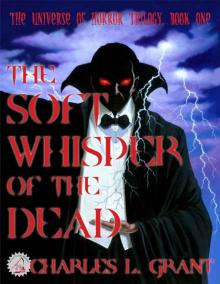 The Universe of Horror Volume 1: The Soft Whisper of the Dead (Neccon Classic Horror)
The Universe of Horror Volume 1: The Soft Whisper of the Dead (Neccon Classic Horror)![[Oxrun Station] Dialing The Wind Read online](http://i1.bookreadfree.com/i/03/19/oxrun_station_dialing_the_wind_preview.jpg) [Oxrun Station] Dialing The Wind
[Oxrun Station] Dialing The Wind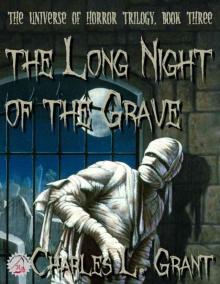 The Universe of Horror Volume 3: The Long Night of the Grave (Neccon Classic Horror)
The Universe of Horror Volume 3: The Long Night of the Grave (Neccon Classic Horror)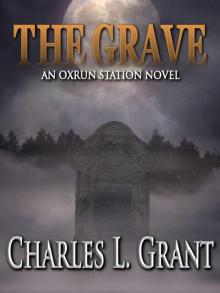 The Grave - An Oxrun Station Novel (Oxrun Station Novels)
The Grave - An Oxrun Station Novel (Oxrun Station Novels)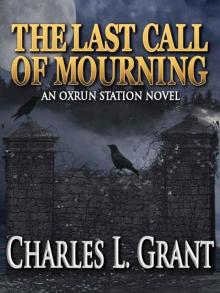 The Last Call of Mourning - An Oxrun Station Novel (Oxrun Station Novels)
The Last Call of Mourning - An Oxrun Station Novel (Oxrun Station Novels)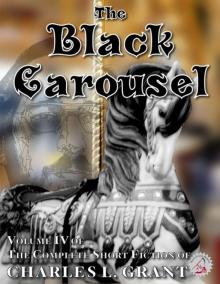 The Complete Short Fiction of Charles L. Grant, Volume IV: The Black Carousel
The Complete Short Fiction of Charles L. Grant, Volume IV: The Black Carousel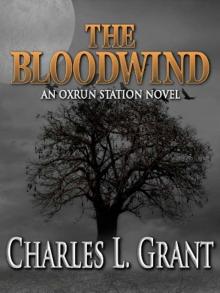 The Bloodwind - An Oxrun Station Novel (Oxrun Station Novels)
The Bloodwind - An Oxrun Station Novel (Oxrun Station Novels)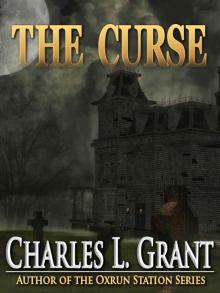 The Curse
The Curse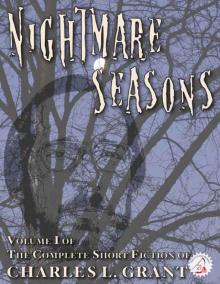 The Complete Short Fiction of Charles L. Grant Volume 1: Nightmare Seasons (Necon Classic Horror)
The Complete Short Fiction of Charles L. Grant Volume 1: Nightmare Seasons (Necon Classic Horror)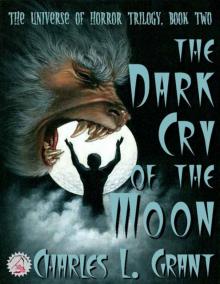 The Universe of Horror Volume 2: The Dark Cry of the Moon (Neccon Classic Horror)
The Universe of Horror Volume 2: The Dark Cry of the Moon (Neccon Classic Horror)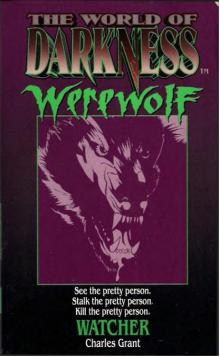 Watcher: Based on the Apocalypse (World of Darkness : Werewolf)
Watcher: Based on the Apocalypse (World of Darkness : Werewolf)![[Oxrun Station] The Bloodwind Read online](http://i1.bookreadfree.com/i/03/25/oxrun_station_the_bloodwind_preview.jpg) [Oxrun Station] The Bloodwind
[Oxrun Station] The Bloodwind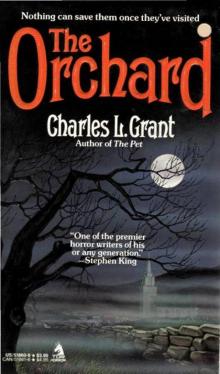 The Orchard
The Orchard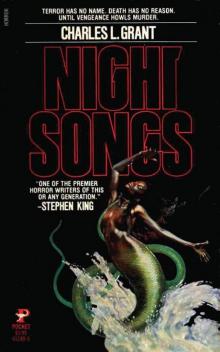 Night Songs
Night Songs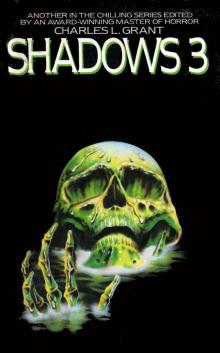 Shadows 3
Shadows 3![Symphony - [Millennium Quartet 01] Read online](http://i1.bookreadfree.com/i1/04/02/symphony_-_millennium_quartet_01_preview.jpg) Symphony - [Millennium Quartet 01]
Symphony - [Millennium Quartet 01] The Hour of the Oxrun Dead (Necon Classic Horror)
The Hour of the Oxrun Dead (Necon Classic Horror)![In the Mood - [Millennium Quartet 02] Read online](http://i1.bookreadfree.com/i1/03/31/in_the_mood_-_millennium_quartet_02_preview.jpg) In the Mood - [Millennium Quartet 02]
In the Mood - [Millennium Quartet 02]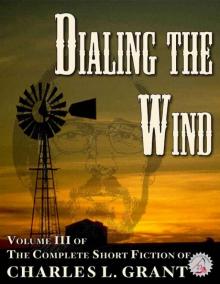 The Complete Short Fiction of Charles L. Grant Volume 3: Dialing the Wind (Neccon Classic Horror)
The Complete Short Fiction of Charles L. Grant Volume 3: Dialing the Wind (Neccon Classic Horror)![[Oxrun Station] The Last Call of Mourning Read online](http://i1.bookreadfree.com/i2/04/05/oxrun_station_the_last_call_of_mourning_preview.jpg) [Oxrun Station] The Last Call of Mourning
[Oxrun Station] The Last Call of Mourning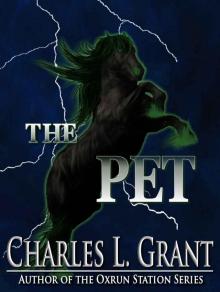 The Pet
The Pet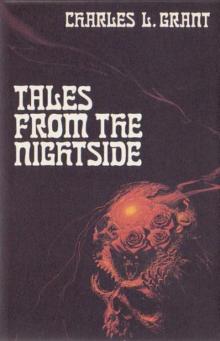 Tales from the Nightside
Tales from the Nightside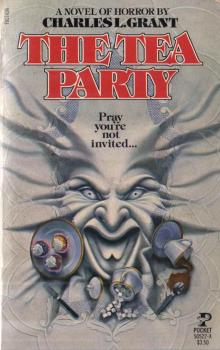 The Tea Party - A Novel of Horror
The Tea Party - A Novel of Horror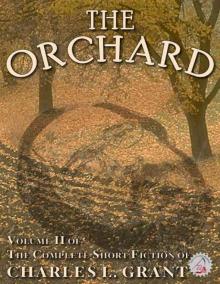 The Complete Short Fiction of Charles L. Grant Volume 2: The Orchard (Necon Classic Horror)
The Complete Short Fiction of Charles L. Grant Volume 2: The Orchard (Necon Classic Horror) Whirlwind
Whirlwind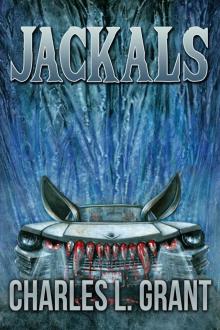 Jackals
Jackals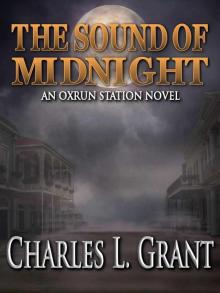 The Sound of Midnight - An Oxrun Station Novel
The Sound of Midnight - An Oxrun Station Novel